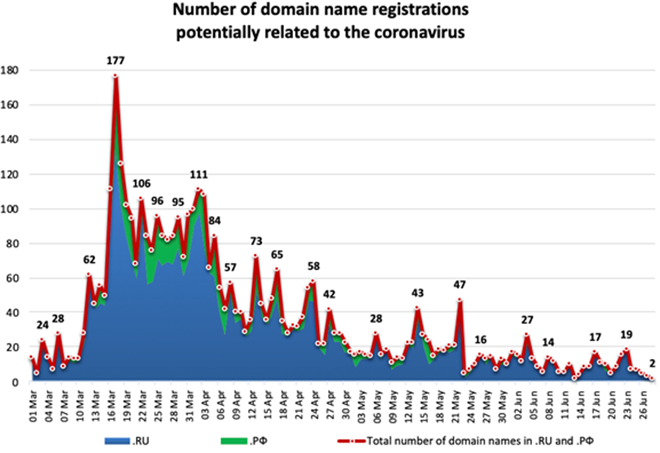The Coordination Center for TLD .RU/.РФ’s regular monitoring of the registry of the .RU and .РФ ccTLDs showed that the number of registrations related to COVID-19 and the pandemic response has increased again.
Over the 10 days since the last study, 83 and 11 coronavirus-related domains appeared in .RU and .РФ, respectively. The total increase was 94 domain names, which is higher than the previous indicators: then 54 coronavirus-related domains were registered in .RU and .РФ. However, this data covers 7 days. If we compare the same time periods, then the number of coronavirus-related domains registered over the 10 days prior to the start of the current monitoring is 89, which is quite comparable with the results of the last 10 days of the month.
Over the entire observation period (January – June 2020), 3,771 names in .RU and 814 in .РФ were added to the list of domains containing the words corona, covid, pandemia, gosuslugi, ковид, пандемия, госуслуги, выплатаand the like; overall, there are now 4,585 coronavirus-related domains in Russian ccTLDs.
Registration of coronavirus-related domains

This research aims to identify suspicious domain names and reduce the harm they could cause with the help of competent organizations. Kaspersky Lab, which is a competent organization participating in the Netoscope scientific and technical project, flagged 1,864 coronavirus-related domains (1,565 domains in .RU and 299 domains in .РФ) as being a potential data loss threat in its products. The number has increased by only 1 since the previous check.
To protect yourselves from cyber fraud now, during the pandemic, and in the future, internet security experts advise users to install antivirus software on each device connected to the internet; not to enter personal information or account and online banking credentials on sites that do not support encryption (there is no https:// before the address); to check domain names for typos; not to open executable files in spam emails; and also to visit official sources for information on the coronavirus (the Russian site: стопкоронавирус.рф). Check our guide on what to do if you encounter a fraudulent site.



